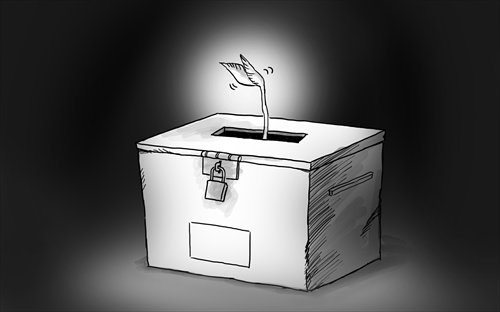HOME >> OP-ED
Turnout shows Afghans yearn for democracy
By Richard Ghiasy Source:Global Times Published: 2014-4-13 22:18:01

Illustration: Liu Rui/GT
On April 5, some 7 million Afghans cast their vote under the supervision of 7,000 observers at over 20,000 polling stations across the country. The outcome of this historic presidential election will determine Afghanistan's course over the next few years.
The final tally is still a few weeks away. Votes need to be collected from remote villages, some by donkey, and this time frame will also allow for fraud cases and electoral violations to be investigated. More than 3,100 complaints, mainly about operational matters, were filed with the independent election institutions.
Preliminary counts show that former World Bank official and former finance minister of Ashraf Ghani Ahmadzai, and opposition leader and former foreign minister Abdullah Abdullah are in the lead. Ghani is anticipated to be the best candidate for reform and economic development.
So far, neither seems to have exceeded the 50 percent threshold that will result in an immediate victory. A runoff election is therefore very likely, postponing the introduction of the new leadership.
Many in Kabul had counted on sitting President Hamid Karzai's favorite successor out of the 11 initial candidates to lead the polls: former foreign minister Zalmai Rassoul. If he fails to win, it should diminish Karzai's sway over the new administration.
Surprisingly, election day went relatively smooth and saw all ethnic groups and both genders, as some 35 percent of voters were women, express their preference as did many first-time voters, often in stormy weather conditions.
The voters turnout of 7 million, out of a UN estimated 12 million eligible voters, is evidence that Afghans have come to realize the importance of active participation in democracy. In the last election in 2009, voter turnout was a mere 4.6 million. This election's turnout would have most likely been higher if not for insurgency threats and the authority of militant groups over swaths of the country.
Both Ghani and Abdullah have confirmed in the run-up to the elections that they will sign the Bilateral Security Agreement (BSA) with the US, an act that current Karzai has declined. Karzai's intransigence has come despite the BSA winning widespread endorsement of both civil society and the country's elders, leaders and advisors during the Loya Jirga, Afghan's "Grand Council," last year.
The continuing presence of US troops on Afghan soil, even if in a capacity of training and supervision, will function as a safety gauge in dark scenarios, such as ethnic fractioning of the Afghan National Army and possible reinvigoration of insurgent groups. The latter will remain likely if the country continues to be subject to the current slow pace of inclusive socioeconomic development. The nation's security transition relies on external support and will face grave challenges if in financial distress.
Hopefully, the first and possible second round of election will be timely and cordial. The nation is in dire need of a united and visionary government, and a realistic development strategy is urgently needed to raise standards of living and improve the security situation.
While elections guarantee neither good leaders nor effective governance, this vote is a historic moment for this young democracy.
The new leadership will help determine to a fair extent whether elections can be sustained during the country's development trajectory: Democracy needs inclusive socioeconomic development.
Considering that 68 percent of the population is under 25, the next administration will have to act swiftly to create an inclusive ecology that educates and employs Afghan youth, lifting them out of decades-long poverty. That is precisely what pushed young voters to the ballot box , and precisely what they will be expecting from Afghanistan's new leadership.
The author is a research fellow at the Afghan Institute for Strategic Studies in Kabul, Afghanistan. opinion@globaltimes.com.cn
Posted in: Viewpoint